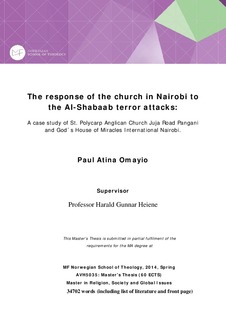The response of the church in Nairobi to the Al-Shabaab terror attacks: A case study of St. Polycarp Anglican Church Juja Road Pangani and God`s House of Miracles International Nairobi
Master thesis
Permanent lenke
http://hdl.handle.net/11250/221495Utgivelsesdato
2014-09-24Metadata
Vis full innførselSamlinger
Sammendrag
In October 2011, the Kenya Army entered Somalia in an operation to protect the Kenyan people and interests from attacks by the Al-Qaeda affiliate, Al- Shabaab based in Somalia. In retaliation, the Al- Shabaab intensified its attacks inside Kenya even targeting churches. The purpose of this thesis is to gain an in depth understanding how the conflict attempted to turn from “war on terror” to a religious one and how the church in Nairobi responded to the attacks. A literature review shows that religion can be said to be “back” in the public sphere today and it is playing a significant role in many conflicts going on in the world today. The research will contribute to the knowledge about the role of religion in conflicts.
A case study methodology was used and interviews were carried out with individuals and groups who were either victims of the attacks or key informants. The study found out that the Al- Shabaab failed to achieve its aim of causing religious animosity in Kenya by attacking churches largely due to the way the churches responded. Interreligious forums and communication, responsible religious leadership, religious teachings and practices and early government intervention were key contributors to the understanding and tolerance that the church exhibited. The informants also expressed that there is need to strengthen the existing interreligious communications based on honesty, openness and respect. Though they lauded the government for its intervention, they however called on the government to be bolder and open in dealing with people trying to cause conflict in the name of religion so as to prevent future occurrences and facilitate healing and reconciliation of those affected.
